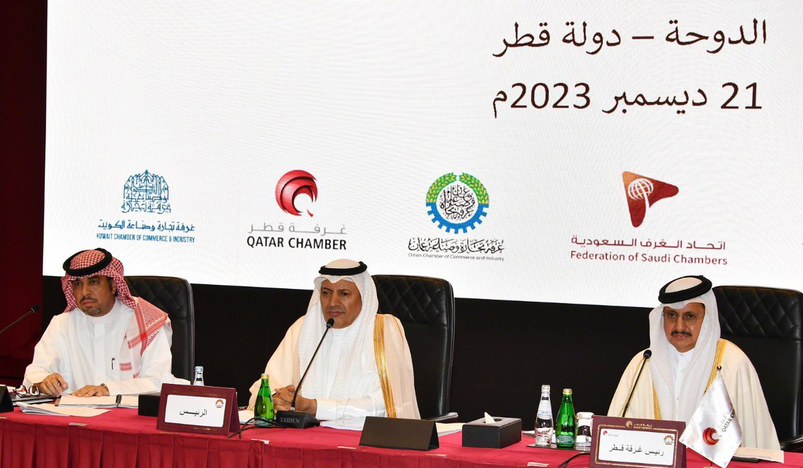
Qatar Chamber
HE Chairman of Qatar Chamber (QC) Sheikh Khalifa bin Jassim Al-Thani emphasized the pivotal role of the private sector in achieving the Gulf economic integration, noting that the ongoing political and economic shifts affecting the global economy, coupled with the current geopolitical challenges and their impacts on Gulf countries, have compelled redoubling the efforts in enhancing economic, trade, and investment cooperation among GCC states.
This came in His Excellency's remarks at the 63rd board of directors meeting of the Federation of GCC Chambers (FGCCC) at the Sheraton Hotel. The meeting was held under the chairmanship of HE President of the Federation of GCC Chambers (FGCCC) and President of the Saudi Chambers of Commerce, Hassan bin Muajab Al Huwizi, and was attended by Heads of GCC chambers.
The meeting discussed several topics in connection with enhancing economic and trading links between the GCC states, in addition to revitalizing the role of the private sector in the Gulf economy, in a way that helps in maximising the intra-Gulf trade.
In his remarks, HE Qatar Chamber's Chairman emphasized that the GCC possesses significant potential and capabilities, in addition to a strong desire and will to achieve economic unity, both at the leadership and public levels.
His Excellency stressed that the GCC owns all the potential to become a strong economic alliance capable of imposing itself on the global economic map, indicating that this is attributed to the natural resources it owns, and its distinctive geographical location, in addition to the robust relations with a multitude of global economic entities and alliances.
HE Sheikh Khalifa underscored the pivotal role of the Gulf private sector in fostering economic integration among member states, the significance of collaborative efforts between member chambers to support the Gulf private sector, strengthen alliances, and foster partnerships among Gulf firms.
Furthermore, he highlighted the importance of boosting cooperation between Gulf businessmen and activating mutual investments to boost Gulf intra-trade, which has exceeded $100 billion, appreciating efforts made by GCC countries for achieving the Gulf economic integration.
HE added: "In this regard, we appreciate the efforts made by our countries to achieve Gulf economic integration. We hope to witness increased cooperation between the public and private sectors within our nations, aiming to overcome any challenges that may hinder such integration. Additionally, we aspire to enhance investment incentives, empowering the Gulf private sector to play a crucial role in the comprehensive economic development of the Gulf region." QC Chairman affirmed the State of Qatars support for all Gulf efforts aimed at achieving Gulf economic integration, stressing that the Qatar Chamber looks forward to strengthening cooperation between the Qatari private sector and its counterparts in GCC countries.
For his part, HE President of the Federation of GCC Chambers (FGCCC) and President of the Saudi Chambers of Commerce, Hassan bin Muajab Al Huwizi highlighted the numerous developments in Gulf economic affairs within the GCC. He noted the positive growth achieved by GCC countries, in which the private sector played a key role.
GCC countries have achieved higher rankings in various global indicators, including competitiveness. The countries are among the most important global economies, attracting both local and foreign investments and experiencing remarkable growth in promising sectors such as technology and tourism, he added.
Al Huwizi underscored that the FGCCC should capitalize on opportunities arising from the council's visions, strengthen partnerships with concerned bodies in the GCC countries at the highest levels, and foster coordination with the GCC General Secretariat, aiming to empower the private sector and increase its contribution in the GCC GDP.
He stressed that the FGCCC has closely collaborated with various Gulf governmental institutions, including the GCC General Secretariat. Al Huwizi noted that this collaboration involves formulating economic policies by providing studies and reports that reflect the views of the Gulf private sector on economic issues. The FGCCC also actively participates in meetings and workshops organized by the GCC General Secretariat with member states to empower the private sector.
Elaborating on the accomplishments of the FGCCC, Al Huwizi indicated that it has successfully addressed 25 out of 58 topics discussed in the Consultative Meetings with the Ministers of Trade and Industry in GCC countries. Additionally, it has maintained ongoing participation with the GCC Customs Union Authority, among other achievements.
HE President of the FGCCC and President of the Saudi Chambers of Commerce said that these achievements underscore the need for increased efforts to fulfill our responsibilities in the current phase, during which the GCC states aim to enhance integration in economic sectors and address common issues like industry, mining, tourism, renewable energy, local content, and others. He emphasized the significance of activating the strategy through which they aspire to lead in representing the Gulf private sector.
The meeting's agenda included the approval of the previous meeting's minutes and the announcement of the transition of the Federation's Presidency to the Oman Chamber of Commerce and Industry for the 23rd session from Feb. 10, 2024, to Feb. 9, 2026.
The agenda also included the follow-up on resolutions from the 62nd meeting, the draft work programme of the General Secretariat of the Federation for 2024, and the draft estimated budget for 2024. Additionally, the meeting addressed the outcomes of the consultative meeting with Their Excellencies and the Ministers of Trade and Industry of the GCC countries.
(QNA)
.jpg)
Qatar Secures Place Among the World's Top 10 Wealthiest Nations
.jpg)
Hamad International Airport Witnesses Record Increase in Passenger Traffic

Saudi Arabia: Any visa holder can now perform Umrah

What are Qatar's Labour Laws on Annual Leave?
Leave a comment